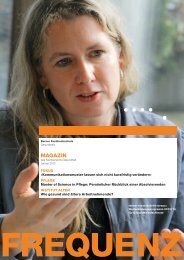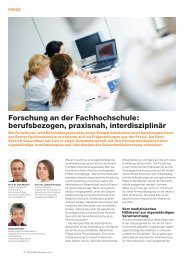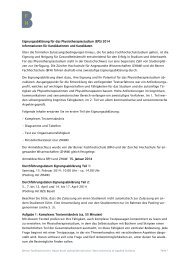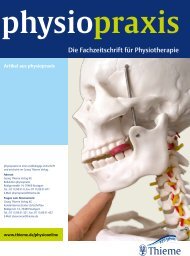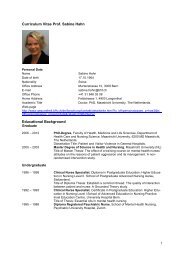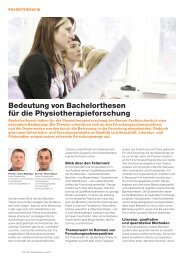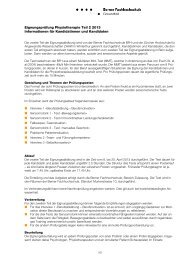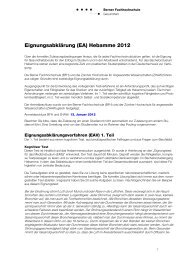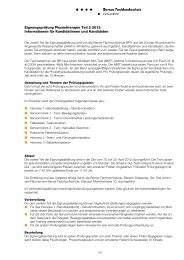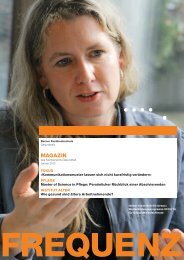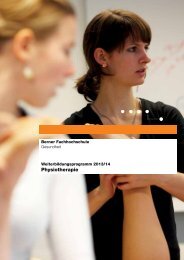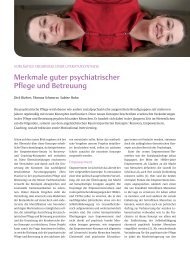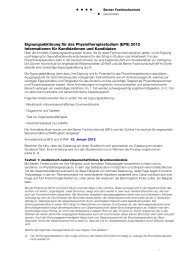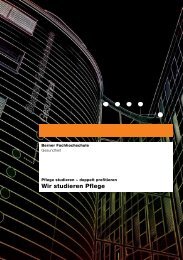- Page 1 and 2:
eS18 Physiotherapy Volume 97 Supple
- Page 3 and 4:
eS20 and 9 for women in the three y
- Page 5 and 6:
eS22 arch supports and of different
- Page 7 and 8:
eS24 Keywords: Hemodialysis; Bone m
- Page 9 and 10:
eS26 Results: The RV, TLC, EVC, Sta
- Page 11 and 12:
eS28 Methods: A comprehensive self-
- Page 13 and 14:
eS30 Research Report Poster Display
- Page 15 and 16:
eS32 Research Report Poster Display
- Page 17 and 18:
eS34 but soon decreased and then re
- Page 19 and 20:
eS36 versity of Toronto Kenya Worki
- Page 21 and 22:
eS38 participants. All of the subje
- Page 23 and 24:
eS40 Research Report Poster Display
- Page 25 and 26:
eS42 ogy and for the physiotherapis
- Page 27 and 28:
eS44 Research Report Poster Display
- Page 29 and 30:
eS46 primarily by walking 10,000 st
- Page 31 and 32:
eS48 least 30 minutes of rest betwe
- Page 33 and 34:
eS50 Research Report Platform Prese
- Page 35 and 36:
eS52 Implications: Pain body diagra
- Page 37 and 38:
eS54 Methods: A total of 10 partici
- Page 39 and 40:
eS56 which may reflect on student
- Page 41 and 42:
eS58 expiratory (PE Max.) pressure,
- Page 43 and 44:
eS60 ing two months, twice a week,
- Page 45 and 46:
eS62 Research Report Poster Display
- Page 47 and 48:
eS64 is a need to investigate the r
- Page 49 and 50:
eS66 Results: Throughout the proced
- Page 51 and 52:
eS68 Pain Assessment in Clinical Tr
- Page 53 and 54:
eS70 Research Report Poster Display
- Page 55 and 56:
eS72 Research Report Poster Display
- Page 57 and 58:
eS74 of the Sinusitis Symptom Score
- Page 59 and 60:
eS76 5th metatarsal bone fracture o
- Page 61 and 62:
eS78 and the Benefoot walker, using
- Page 63 and 64:
eS80 LBP (n = 10) and without LBP (
- Page 65 and 66:
eS82 were obtained at the time of i
- Page 67 and 68:
eS84 Methods: All subjects underwen
- Page 69 and 70:
eS86 Research Report Poster Display
- Page 71 and 72:
eS88 ever it is important to be awa
- Page 73 and 74:
eS90 apy interventions based on cli
- Page 75 and 76:
eS92 Ethics approval: Ethics approv
- Page 77 and 78:
eS94 Research Report Platform Prese
- Page 79 and 80:
eS96 4/10 by the 3rd session, decre
- Page 81 and 82:
eS98 Participants: 12 healthy volun
- Page 83 and 84:
eS100 Research Report Poster Displa
- Page 85 and 86:
eS102 mation are pronounced, has no
- Page 87 and 88:
eS104 Results: Mean muscle length (
- Page 89 and 90:
eS106 tion of seated OKCKE resistan
- Page 91 and 92:
eS108 Research Report Poster Displa
- Page 93 and 94:
eS110 Relevance: Monitoring a patie
- Page 95 and 96:
eS112 Funding acknowledgements: The
- Page 97 and 98:
eS114 dent cohorts will be followed
- Page 99 and 100:
eS116 investigated. There is a need
- Page 101 and 102:
eS118 Results: In population A join
- Page 103 and 104:
eS120 A thermometer with infrared w
- Page 105 and 106:
eS122 Research Report Platform Pres
- Page 107 and 108:
eS124 Implications: With more stude
- Page 109 and 110:
eS126 Results: Pain intensity decre
- Page 111 and 112:
eS128 Analysis: The data obtained w
- Page 113 and 114:
eS130 cation use and the extent of
- Page 115 and 116:
eS132 Research Report Poster Displa
- Page 117 and 118:
eS134 Conclusions: Despite anecdota
- Page 119 and 120:
eS136 10 neck-specific questionnair
- Page 121 and 122:
eS138 Research Report Poster Discus
- Page 123 and 124:
eS140 Analysis: For reliability ana
- Page 125 and 126:
eS142 the movement (or not) is a pr
- Page 127 and 128:
eS144 Research Report Poster Displa
- Page 129 and 130:
eS146 Keywords: Physical therapy; E
- Page 131 and 132:
eS148 Analysis: Functional scales w
- Page 133 and 134:
eS150 sided hemiplegia, GMFCS I = 8
- Page 135 and 136:
eS152 Research Report Poster Displa
- Page 137 and 138:
eS154 for video-rating. The test-re
- Page 139 and 140:
eS156 breathing may help to identif
- Page 141 and 142:
eS158 Research Report Poster Displa
- Page 143 and 144:
eS160 Funding acknowledgements: Stu
- Page 145 and 146:
eS162 Participants: The participant
- Page 147 and 148:
eS164 Research Report Poster Displa
- Page 149 and 150:
eS166 therapeutic exercises through
- Page 151 and 152:
eS168 Research Report Poster Displa
- Page 153 and 154:
eS170 or maintain independence. The
- Page 155 and 156:
eS172 ordinators revealed no clear
- Page 157 and 158:
eS174 Ethics approval: This study h
- Page 159 and 160:
eS176 Keywords: Motor imagery; Late
- Page 161 and 162:
eS178 Participants’ talk was set
- Page 163 and 164:
eS180 Participants: 54 sedentary, r
- Page 165 and 166:
eS182 therapies like HILT are there
- Page 167 and 168:
eS184 Research Report Poster Displa
- Page 169 and 170:
eS186 59 (SD 26) to 83 (SD 30) W. 4
- Page 171 and 172:
eS188 Analysis: The data obtained w
- Page 173 and 174:
eS190 Methods: The rectus abdominis
- Page 175 and 176:
eS192 ered data included demographi
- Page 177 and 178:
eS194 Ethics approval: Subjects sig
- Page 179 and 180:
eS196 Ethics approval: Ethic approv
- Page 181 and 182:
eS198 Keywords: Knee osteoarthritis
- Page 183 and 184:
eS200 Implications: The present stu
- Page 185 and 186:
eS202 Participants: Fifty-six commu
- Page 187 and 188: eS204 Research Report Poster Displa
- Page 189 and 190: eS206 Research Report Poster Displa
- Page 191 and 192: eS208 Methods: Thirty-four infrared
- Page 193 and 194: eS210 Research Report Poster Displa
- Page 195 and 196: eS212 was manipulated the least oft
- Page 197 and 198: eS214 Relevance: Knowledge of the d
- Page 199 and 200: eS216 Research Report Poster Displa
- Page 201 and 202: eS218 duced lower force than the N
- Page 203 and 204: eS220 Methods: The 12-item Chinese
- Page 205 and 206: eS222 Research Report Poster Displa
- Page 207 and 208: eS224 Research Report Platform Pres
- Page 209 and 210: eS226 and (18.6%) respectively. A s
- Page 211 and 212: eS228 were asked to participate in
- Page 213 and 214: eS230 data analysis (mean age 59.9
- Page 215 and 216: eS232 1 University of Nottingham, D
- Page 217 and 218: eS234 of health experience pertinen
- Page 219 and 220: eS236 itors are thought to provide
- Page 221 and 222: eS238 Research Report Poster Displa
- Page 223 and 224: eS240 Research Report Poster Displa
- Page 225 and 226: eS242 Relevance: The PEDro web-site
- Page 227 and 228: eS244 Funding acknowledgements: We
- Page 229 and 230: eS246 or memory that impeded measur
- Page 231 and 232: eS248 An attractive and flexible to
- Page 233 and 234: eS250 Research Report Poster Displa
- Page 235 and 236: eS252 pants to ascertain exercise c
- Page 237: eS254 Research Report Poster Displa
- Page 241 and 242: eS258 Research Report Poster Displa
- Page 243 and 244: eS260 physiotherapy and a Persons
- Page 245 and 246: eS262 the SAMP has excellent intra
- Page 247 and 248: eS264 Research Report Poster Displa
- Page 249 and 250: eS266 field notes were analysed lin
- Page 251 and 252: eS268 ical passive markers were aff
- Page 253 and 254: eS270 conducted. The references of
- Page 255 and 256: eS272 stay was respectively 7 ± 8
- Page 257 and 258: eS274 data normalised to an observa
- Page 259 and 260: eS276 Relevance: Arthritis seriousl
- Page 261 and 262: eS278 Analysis: Stepwise multiple r
- Page 263 and 264: eS280 inspiratory muscle training (
- Page 265 and 266: eS282 Research Report Poster Displa
- Page 267 and 268: eS284 from medical, visual, neurops
- Page 269 and 270: eS286 Chi-Square, ANOVA for repeate
- Page 271 and 272: eS288 Participants: FwEMG study: 10
- Page 273 and 274: eS290 and pain control. No publishe
- Page 275 and 276: eS292 PFPS would generate changes i
- Page 277 and 278: eS294 Ethics approval: This researc
- Page 279 and 280: eS296 passive observation. Tutors a
- Page 281 and 282: eS298 by Visual Analog Scale. There
- Page 283 and 284: eS300 lyze three case studies (desc
- Page 285 and 286: eS302 Research Report Platform Pres
- Page 287 and 288: eS304 between the activities sectio
- Page 289 and 290:
eS306 the floor. Impaired mobility
- Page 291 and 292:
eS308 Implications: Rehabilitation
- Page 293 and 294:
eS310 Research Report Poster Displa
- Page 295 and 296:
eS312 VO2 was the most dominant pre
- Page 297 and 298:
eS314 of different types of individ
- Page 299 and 300:
eS316 Analysis: The sample was char
- Page 301 and 302:
eS318 vascular risk and delay onset
- Page 303 and 304:
eS320 Results: 67 patients [with th
- Page 305 and 306:
eS322 Research Report Poster Displa
- Page 307 and 308:
eS324 cal capacity, health related
- Page 309 and 310:
eS326 pain levels. PES electrodes w
- Page 311 and 312:
eS328 Research Report Poster Displa
- Page 313 and 314:
eS330 Research Report Poster Displa
- Page 315 and 316:
eS332 correlation between BBS and M
- Page 317 and 318:
eS334 Foundation Blood Center of Ri
- Page 319 and 320:
eS336 Research Report Poster Displa
- Page 321 and 322:
eS338 Funding acknowledgements: The
- Page 323 and 324:
eS340 using the Pearson (variables
- Page 325 and 326:
eS342 ditions of the forearm lastin
- Page 327 and 328:
eS344 Research Report Platform Pres
- Page 329 and 330:
eS346 to the parents, stretching co
- Page 331 and 332:
eS348 ronments. HAT training was di
- Page 333 and 334:
eS350 Research Report Poster Displa
- Page 335 and 336:
eS352 increase of 164 ± 183% of So
- Page 337 and 338:
eS354 Ethics approval: Approved by
- Page 339 and 340:
eS356 concerning improvement of bal
- Page 341 and 342:
eS358 Research Report Poster Displa
- Page 343 and 344:
eS360 fulness of positioning for sl
- Page 345 and 346:
eS362 Methods: The knee joint posit
- Page 347 and 348:
eS364 strategies are needed to inte
- Page 349 and 350:
eS366 Conclusions: This study showe
- Page 351 and 352:
eS368 trends towards increased pain
- Page 353 and 354:
eS370 Analysis: The 6 central of 10
- Page 355 and 356:
eS372 Relevance: The way of landing
- Page 357 and 358:
eS374 have difficulty adapting to g
- Page 359 and 360:
eS376 Research Report Poster Displa
- Page 361 and 362:
eS378 Funding acknowledgements: Non
- Page 363 and 364:
eS380 with a sensitivity of 0.74 an
- Page 365 and 366:
eS382 38.9 ± 10.5 years and 80% wi
- Page 367 and 368:
eS384 Interdisciplinary Research in
- Page 369 and 370:
eS386 Results: The Pearson’s line
- Page 371 and 372:
eS388 Analysis: Differences in base
- Page 373 and 374:
eS390 Research Report Platform Pres
- Page 375 and 376:
eS392 (p = 0.002). Nine participant
- Page 377 and 378:
eS394 Participants: A purposive sam
- Page 379 and 380:
eS396 Participants: We assessed sam
- Page 381 and 382:
eS398 Methods: All skin fold measur
- Page 383 and 384:
eS400 Relevance: PPS is a condition
- Page 385 and 386:
eS402 Research Report Poster Displa
- Page 387 and 388:
eS404 outcome measures. The alpha l
- Page 389 and 390:
eS406 coefficient r = 0.99). A pair
- Page 391 and 392:
eS408 serratus anterior. Subjects p
- Page 393 and 394:
eS410 categories. In both studies t
- Page 395 and 396:
eS412 item-total correlation and Cr
- Page 397 and 398:
eS414 Research Report Poster Displa
- Page 399 and 400:
eS416 Research Report Poster Displa
- Page 401 and 402:
eS418 vated more VL and BF muscles
- Page 403 and 404:
eS420 and extensors were recruited.
- Page 405 and 406:
eS422 Research Report Platform Pres
- Page 407 and 408:
eS424 Research Report Poster Displa
- Page 409 and 410:
eS426 Research Report Poster Displa
- Page 411 and 412:
eS428 Keywords: Mucociliary clearan
- Page 413 and 414:
eS430 for degree of sinovite. Pears
- Page 415 and 416:
eS432 Because treatments involve bo
- Page 417 and 418:
eS434 Research Report Poster Displa
- Page 419 and 420:
eS436 IR ROM of the dominant should
- Page 421 and 422:
eS438 Methods: All subjects perform
- Page 423 and 424:
eS440 jects’ deep cervical muscle
- Page 425 and 426:
eS442 Götaland, Trygg Hansa Resear
- Page 427 and 428:
eS444 main outcomes; EE/day and, st
- Page 429 and 430:
eS446 physical activity level of >3
- Page 431 and 432:
eS448 Ethics approval: Approved by
- Page 433 and 434:
eS450 Methods: A narrative inquiry
- Page 435 and 436:
eS452 Conclusions: The outcome show
- Page 437 and 438:
eS454 Methods: Cross sectional data
- Page 439 and 440:
eS456 appropriately applied near th
- Page 441 and 442:
eS458 Research Report Poster Displa
- Page 443 and 444:
eS460 Research Report Platform Pres
- Page 445 and 446:
eS462 121.3-191 kPa; S2: 140.5-162.
- Page 447 and 448:
eS464 ment and comments upon the pa
- Page 449 and 450:
eS466 Relevance: Mat activity repre
- Page 451 and 452:
eS468 Research Report Poster Displa
- Page 453 and 454:
eS470 Implications: The findings of
- Page 455 and 456:
eS472 tional magnet resonance imagi
- Page 457 and 458:
eS474 University of the Western Cap
- Page 459 and 460:
eS476 cise) on improvements in walk
- Page 461 and 462:
eS478 research funding supported fr
- Page 463 and 464:
eS480 Participants: Fifty-one indiv
- Page 465 and 466:
eS482 86 years, four of whom were i
- Page 467 and 468:
eS484 Research Report Poster Displa
- Page 469 and 470:
eS486 age = 39, IQR: 17) were recru
- Page 471 and 472:
eS488 Research Report Poster Displa
- Page 473 and 474:
eS490 graphic/anthropometric variab
- Page 475 and 476:
eS492 Research Report Platform Pres
- Page 477 and 478:
eS494 a Pearson-correlation with SP
- Page 479 and 480:
eS496 Council sets the economical f
- Page 481 and 482:
eS498 Methods: Participants complet
- Page 483 and 484:
eS500 Research Report Poster Displa
- Page 485 and 486:
eS502 Research Report Poster Displa
- Page 487 and 488:
eS504 in ES treated compared to con
- Page 489 and 490:
eS506 years) and 67 in the analysis
- Page 491 and 492:
eS508 Research Report Poster Displa
- Page 493 and 494:
eS510 Research Report Poster Displa
- Page 495 and 496:
eS512 effect was non-significant (p
- Page 497 and 498:
eS514 Research Report Poster Displa
- Page 499 and 500:
eS516 carpal tunnel is a promising
- Page 501 and 502:
eS518 transcripts were randomly sel
- Page 503 and 504:
eS520 Implications: Understanding t
- Page 505 and 506:
eS522 that together account for 57%
- Page 507 and 508:
eS524 Research Report Poster Displa
- Page 509 and 510:
eS526 % affected side expansion at
- Page 511 and 512:
eS528 Methods: The reaching motion
- Page 513 and 514:
eS530 Research Report Poster Displa
- Page 515 and 516:
eS532 Keywords: Cervical spinal cor
- Page 517 and 518:
eS534 having right to pension). Our
- Page 519 and 520:
eS536 Conclusions: The results of t
- Page 521 and 522:
eS538 Research Report Poster Displa
- Page 523 and 524:
eS540 Results: (1) The information
- Page 525 and 526:
eS542 late means, range and standar
- Page 527 and 528:
eS544 Research Report Poster Displa
- Page 529 and 530:
eS546 icant difference either for t
- Page 531 and 532:
eS548 Research Report Poster Displa
- Page 533 and 534:
eS550 (3) and similar perceptions a
- Page 535 and 536:
eS552 prevention of non-specific ne
- Page 537 and 538:
eS554 test positions and to compare
- Page 539 and 540:
eS556 Intervention consisted of pla
- Page 541 and 542:
eS558 Research Report Poster Displa
- Page 543 and 544:
eS560 Ethics approval: The study wa
- Page 545 and 546:
eS562 Results: The RPMD identified
- Page 547 and 548:
eS564 It consists of three sections
- Page 549 and 550:
eS566 ile hypertonic saline (5% NaC
- Page 551 and 552:
eS568 Relevance: Maximize sports pe
- Page 553 and 554:
eS570 Research Report Platform Pres
- Page 555 and 556:
eS572 Ethics approval: Ethical clea
- Page 557 and 558:
eS574 Results: Although all women w
- Page 559 and 560:
eS576 tor function as well as dynam
- Page 561 and 562:
eS578 Research Report Poster Displa
- Page 563 and 564:
eS580 muscle activity rate of ES, p
- Page 565 and 566:
eS582 Conclusions: The present stud
- Page 567 and 568:
eS584 through the medial 1/3 of the
- Page 569 and 570:
eS586 Research Report Poster Displa
- Page 571 and 572:
eS588 Research Report Poster Displa
- Page 573 and 574:
eS590 Research Report Poster Displa
- Page 575 and 576:
eS592 of IAP value. The peak IAP ra
- Page 577 and 578:
eS594 Results: The experimental and
- Page 579 and 580:
eS596 Research Report Platform Pres
- Page 581 and 582:
eS598 important implications for un
- Page 583 and 584:
eS600 Furthermore, it serves as a g
- Page 585 and 586:
eS602 Keywords: Cerebral palsy; Phy
- Page 587 and 588:
eS604 back pain (40%, 50%). Trends
- Page 589 and 590:
eS606 years), treated with knee art
- Page 591 and 592:
eS608 Research Report Poster Displa
- Page 593 and 594:
eS610 second/V 5-15th second. The s
- Page 595 and 596:
eS612 JND and left semispinalis siz
- Page 597 and 598:
eS614 formed to the left arm was us
- Page 599 and 600:
eS616 Research Report Poster Displa
- Page 601 and 602:
eS618 as for MPI-S affective distre
- Page 603 and 604:
eS620 for use in rehabilitation set
- Page 605 and 606:
eS622 nificant lower and timed earl
- Page 607 and 608:
eS624 ogy, Intervention and Brain U
- Page 609 and 610:
eS626 60%VF = 6.0 km/hour, 80%VF =
- Page 611 and 612:
eS628 of insufficient vascular supp
- Page 613 and 614:
eS630 to evaluate the disability ca
- Page 615 and 616:
eS632 Results: In general and physi
- Page 617 and 618:
eS634 Methods: Each student was ask
- Page 619 and 620:
eS636 posture and a nodding head (c
- Page 621 and 622:
eS638 Research Report Platform Pres
- Page 623 and 624:
eS640 ward to translate, the approp
- Page 625 and 626:
eS642 patients lap), but the elbow
- Page 627 and 628:
eS644 Research Report Poster Displa
- Page 629 and 630:
eS646 Ethics approval: Ethical cons
- Page 631 and 632:
eS648 and alleviation of pain, e.g.
- Page 633 and 634:
eS650 siflexion) and no history of
- Page 635 and 636:
eS652 Research Report Poster Displa
- Page 637 and 638:
eS654 Conclusions: Consensus was re
- Page 639 and 640:
eS656 Results: The statistical anal
- Page 641 and 642:
eS658 Gait Index (DGI). Balance was
- Page 643 and 644:
eS660 Research Report Poster Displa
- Page 645 and 646:
eS662 Conclusions: Meditation walk
- Page 647 and 648:
eS664 met the criterion of having w
- Page 649 and 650:
eS666 Research Report Poster Displa
- Page 651 and 652:
eS668 domains was 0.83, whereas for
- Page 653 and 654:
eS670 was done via phone interviews
- Page 655 and 656:
eS672 Research Report Poster Displa
- Page 657 and 658:
eS674 Research Report Platform Pres
- Page 659 and 660:
eS676 the predominant PFJ OA. A tre
- Page 661 and 662:
eS678 external perturbation indicat
- Page 663 and 664:
eS680 Participants: Forty-four fema
- Page 665 and 666:
eS682 Research Report Platform Pres
- Page 667 and 668:
eS684 12+ months AROM. Flexion and
- Page 669 and 670:
eS686 stand (STS) resistance exerci
- Page 671 and 672:
eS688 information will be used to i
- Page 673 and 674:
eS690 Research Report Platform Pres
- Page 675 and 676:
eS692 impairment and fully recovere
- Page 677 and 678:
eS694 Relevance: A newly designed V
- Page 679 and 680:
eS696 tion (NF and SF) as the fixed
- Page 681 and 682:
eS698 Analysis: Descriptive statist
- Page 683 and 684:
eS700 Research Report Poster Displa
- Page 685 and 686:
eS702 ensure professional accountab
- Page 687 and 688:
eS704 shifting abilities. The outco
- Page 689 and 690:
eS706 Ethics approval: All subjects
- Page 691 and 692:
eS708 Research Report Poster Displa
- Page 693 and 694:
eS710 Research Report Poster Displa
- Page 695 and 696:
eS712 Research Report Poster Discus
- Page 697 and 698:
eS714 inapplicable because they inc
- Page 699 and 700:
eS716 ical problem. The ability of
- Page 701 and 702:
eS718 Implications: Physical therap
- Page 703 and 704:
eS720 tent musculoskeletal pain, an
- Page 705 and 706:
eS722 function increased measured b
- Page 707 and 708:
eS724 neck or upper extremity but w
- Page 709 and 710:
eS726 Research Report Poster Displa
- Page 711 and 712:
eS728 ing, physiotherapists will pl
- Page 713 and 714:
eS730 Research Report Poster Displa
- Page 715 and 716:
eS732 Implications: There is not en
- Page 717 and 718:
eS734 tary behaviour in the workpla
- Page 719 and 720:
eS736 Research Report Poster Displa
- Page 721 and 722:
eS738 during functional reach were
- Page 723 and 724:
eS740 Keywords: Low back pain; Beli
- Page 725 and 726:
eS742 reproducibility were demonstr
- Page 727 and 728:
eS744 munity, Loss of manful activi
- Page 729 and 730:
eS746 given a home based pulmonary
- Page 731 and 732:
eS748 Participants: Convenience sam
- Page 733 and 734:
eS750 independent variables while t
- Page 735 and 736:
eS752 after completion of the test
- Page 737 and 738:
eS754 laser off. After nine session
- Page 739 and 740:
eS756 the 39 patients were classifi
- Page 741 and 742:
eS758 ability are more likely to re
- Page 743 and 744:
eS760 Following pre-test data colle
- Page 745 and 746:
eS762 on a treadmill for 20 minutes
- Page 747 and 748:
eS764 Research Report Poster Displa
- Page 749 and 750:
eS766 Research Report Platform Pres
- Page 751 and 752:
eS768 group only, when pre-post com
- Page 753 and 754:
eS770 ity patients. Repeat mailings
- Page 755 and 756:
eS772 Research Report Poster Displa
- Page 757 and 758:
eS774 tions of prognostic items at
- Page 759 and 760:
eS776 Participants: From June 2009
- Page 761 and 762:
eS778 Conclusions: Rehabilitation g
- Page 763 and 764:
eS780 Analysis: Descriptive statist
- Page 765 and 766:
eS782 Research Report Poster Displa
- Page 767 and 768:
eS784 dence Measure (FIM TM ) score
- Page 769 and 770:
eS786 California State University,
- Page 771 and 772:
eS788 behaviour for individuals who
- Page 773 and 774:
eS790 ables. These variables were i
- Page 775 and 776:
eS792 of normal weight, overweight
- Page 777 and 778:
eS794 Relevance: More than two-thir
- Page 779 and 780:
eS796 in patients with DRF. As per
- Page 781 and 782:
eS798 (1), Encephalitis (1), Cerebe
- Page 783 and 784:
eS800 older adults experience great
- Page 785 and 786:
eS802 Methods: All participants und
- Page 787 and 788:
eS804 Research Report Poster Displa
- Page 789 and 790:
eS806 Research Report Platform Pres
- Page 791 and 792:
eS808 was able to make the distinct
- Page 793 and 794:
eS810 Analysis: Descriptive analyse
- Page 795 and 796:
eS812 Research Report Poster Displa
- Page 797 and 798:
eS814 erogeneity between trials. Th
- Page 799 and 800:
eS816 experiment end respectively,
- Page 801 and 802:
eS818 reliability for single test a
- Page 803 and 804:
eS820 Research Report Poster Displa
- Page 805 and 806:
eS822 Ethics approval: The study wa
- Page 807 and 808:
eS824 Research Report Poster Displa
- Page 809 and 810:
eS826 Research Report Poster Displa
- Page 811 and 812:
eS828 sounds continued for five min
- Page 813 and 814:
eS830 Methods: This study was a coh
- Page 815 and 816:
eS832 Ethics approval: The Universi
- Page 817 and 818:
eS834 Research Report Platform Pres
- Page 819 and 820:
eS836 Conclusions: There is growing
- Page 821 and 822:
eS838 body, nor when they were held
- Page 823 and 824:
eS840 Participants: Members of the
- Page 825 and 826:
eS842 interview transcripts were ch
- Page 827 and 828:
eS844 Methods: A pre-intervention c
- Page 829 and 830:
eS846 Research Report Poster Displa
- Page 831 and 832:
eS848 poses, the Biopac-MP30 equipm
- Page 833 and 834:
eS850 assess the impact of PT inter
- Page 835 and 836:
eS852 Research Report Poster Displa
- Page 837 and 838:
eS854 The assessment procedures, co
- Page 839 and 840:
eS856 completion of the cyclic test
- Page 841 and 842:
eS858 Participants: In the period J
- Page 843 and 844:
eS860 Research Report Platform Pres
- Page 845 and 846:
eS862 greater and more rapid in the
- Page 847 and 848:
eS864 titleing MMAS. No study has i
- Page 849 and 850:
eS866 Analysis: We analysed the out
- Page 851 and 852:
eS868 monoxide, ambient temperature
- Page 853 and 854:
eS870 should lead to development of
- Page 855 and 856:
eS872 Research Report Poster Displa
- Page 857 and 858:
eS874 Conclusions: Performance orie
- Page 859 and 860:
eS876 lacking for its reliability i
- Page 861 and 862:
eS878 ence the rate of report of co
- Page 863 and 864:
eS880 Research Report Platform Pres
- Page 865 and 866:
eS882 and Sensory-motor NSMDA score
- Page 867 and 868:
eS884 who regained some upper limb
- Page 869 and 870:
eS886 Research Report Poster Displa
- Page 871 and 872:
eS888 patients. This assumes both t
- Page 873 and 874:
eS890 Research Report Poster Displa
- Page 875 and 876:
eS892 ing pain was the most common
- Page 877 and 878:
eS894 plane was calculated. A least
- Page 879 and 880:
eS896 Research Report Poster Displa
- Page 881 and 882:
eS898 was maintained above 50% in f
- Page 883 and 884:
eS900 Methods: A qualitative interv
- Page 885 and 886:
eS902 Research Report Platform Pres
- Page 887 and 888:
eS904 The left-right active strengt
- Page 889 and 890:
eS906 18.7% had a, often minimal, p
- Page 891 and 892:
eS908 3 (76.3 ± 16) (P < 0.01). Kn
- Page 893 and 894:
eS910 the entire course living with
- Page 895 and 896:
eS912 Relevance: In Ireland, over 1
- Page 897 and 898:
eS914 comes were average pain inten
- Page 899 and 900:
eS916 Relevance: The economic burde
- Page 901 and 902:
eS918 Research Report Poster Displa
- Page 903 and 904:
eS920 Funding acknowledgements: Iri
- Page 905 and 906:
eS922 vant, the question was revise
- Page 907 and 908:
eS924 patient samples. No studies h
- Page 909 and 910:
eS926 Research Report Poster Displa
- Page 911 and 912:
eS928 Analysis: Statistical analysi
- Page 913 and 914:
eS930 the other group consisted of
- Page 915 and 916:
eS932 Research Report Poster Displa
- Page 917 and 918:
eS934 Research Report Poster Displa
- Page 919 and 920:
eS936 Research Report Poster Displa
- Page 921 and 922:
eS938 health-related quality of lif
- Page 923 and 924:
eS940 who did not receive rehabilit
- Page 925 and 926:
eS942 which could enable as early a
- Page 927 and 928:
eS944 between viral profile, and bo
- Page 929 and 930:
eS946 Keywords: Diabetes; Cardiopul
- Page 931 and 932:
eS948 Research Report Poster Displa
- Page 933 and 934:
eS950 Research Report Poster Displa
- Page 935 and 936:
eS952 (p < 0.001). Nurses considere
- Page 937 and 938:
eS954 for all mRNA data. Post hoc c
- Page 939 and 940:
eS956 Results: The incidence of lym
- Page 941 and 942:
eS958 5D dimensions between young p
- Page 943 and 944:
eS960 in oncology inpatients who we
- Page 945 and 946:
eS962 tion of the disorder, particu
- Page 947 and 948:
eS964 Research Report Poster Displa
- Page 949 and 950:
eS966 considered significant) and I
- Page 951 and 952:
eS968 Results: They highlighted a j
- Page 953 and 954:
eS970 to facilitate clinical decisi
- Page 955 and 956:
eS972 Implications: Deep friction m
- Page 957 and 958:
eS974 Analysis: All texts generated
- Page 959 and 960:
eS976 Research Report Platform Pres
- Page 961 and 962:
eS978 upon referral for a NBBAL in
- Page 963 and 964:
eS980 muscle. The sensibility value
- Page 965 and 966:
eS982 null hypothesis of values (of
- Page 967 and 968:
eS984 Methods: Multidimensional str
- Page 969 and 970:
eS986 Research Report Poster Displa
- Page 971 and 972:
eS988 method for measuring SNS acti
- Page 973 and 974:
eS990 Research Report Poster Displa
- Page 975 and 976:
eS992 Funding acknowledgements: We
- Page 977 and 978:
eS994 used to test the strength of
- Page 979 and 980:
eS996 Research Report Platform Pres
- Page 981 and 982:
eS998 Analysis: The questionnaire d
- Page 983 and 984:
eS1000 January 2010 the first ten v
- Page 985 and 986:
eS1002 Research Report Poster Displ
- Page 987 and 988:
eS1004 der rotation (17.11 < F < 19
- Page 989 and 990:
eS1006 Research Report Poster Displ
- Page 991 and 992:
eS1008 Analysis: The data were anal
- Page 993 and 994:
eS1010 of vulvar pain, in which the
- Page 995 and 996:
eS1012 Research Report Platform Pre
- Page 997 and 998:
eS1014 7 (AT), 30 (RET 1) and 60 (R
- Page 999 and 1000:
eS1016 Implications: Based on the r
- Page 1001 and 1002:
eS1018 ments in sleep quality/patte
- Page 1003 and 1004:
eS1020 knowledge about three condit
- Page 1005 and 1006:
eS1022 assessed for eligibility, 27
- Page 1007 and 1008:
eS1024 Methods: The stair case cons
- Page 1009 and 1010:
eS1026 Research Report Poster Discu
- Page 1011 and 1012:
eS1028 Results: The sitting limits
- Page 1013 and 1014:
eS1030 and in the elderly group bet
- Page 1015 and 1016:
eS1032 sures predicted gait perform
- Page 1017 and 1018:
eS1034 Research Report Poster Displ
- Page 1019 and 1020:
eS1036 Results: A substantial level
- Page 1021 and 1022:
eS1038 study. Health professionals
- Page 1023 and 1024:
eS1040 exercises used to treat RC d
- Page 1025 and 1026:
eS1042 Research Report Poster Displ
- Page 1027 and 1028:
eS1044 tic indicators when working
- Page 1029 and 1030:
eS1046 initial and follow-up scores
- Page 1031 and 1032:
eS1048 divided into a control group
- Page 1033 and 1034:
eS1050 Research Report Poster Displ
- Page 1035 and 1036:
eS1052 extremely significant for p
- Page 1037 and 1038:
eS1054 Methods: Randomized controll
- Page 1039 and 1040:
eS1056 Research Report Platform Pre
- Page 1041 and 1042:
eS1058 approaches to meet the needs
- Page 1043 and 1044:
eS1060 Conclusions: The study confi
- Page 1045 and 1046:
eS1062 correlations with other body
- Page 1047 and 1048:
eS1064 Participants: Eleven childre
- Page 1049 and 1050:
eS1066 Research Report Poster Displ
- Page 1051 and 1052:
eS1068 tive therapy. There is also
- Page 1053 and 1054:
eS1070 Methods: All patients were e
- Page 1055 and 1056:
eS1072 strategies to findings from
- Page 1057 and 1058:
eS1074 and its impact on clinical p
- Page 1059 and 1060:
eS1076 Participants: 40 boys and 40
- Page 1061 and 1062:
eS1078 Research Report Poster Displ
- Page 1063 and 1064:
eS1080 activation (IEMG MBT = 6.6
- Page 1065 and 1066:
eS1082 Inspiratory and expiratory m
- Page 1067 and 1068:
eS1084 Additionally, clinical chara
- Page 1069 and 1070:
eS1086 assessed using the beam walk
- Page 1071 and 1072:
eS1088 tion intervention on improvi
- Page 1073 and 1074:
eS1090 which aspects of a community
- Page 1075 and 1076:
eS1092 Analysis: ANOVA with repeate
- Page 1077 and 1078:
eS1094 Results: The mean and the SD
- Page 1079 and 1080:
eS1096 the maximum inspiratory effo
- Page 1081 and 1082:
eS1098 motion tracking is used to m
- Page 1083 and 1084:
eS1100 era systems. Each participan
- Page 1085 and 1086:
eS1102 Research Report Poster Displ
- Page 1087 and 1088:
eS1104 Research Report Platform Pre
- Page 1089 and 1090:
eS1106 vention group, compared to o
- Page 1091 and 1092:
eS1108 deficits (D), (3) predominan
- Page 1093 and 1094:
eS1110 Research Report Poster Discu
- Page 1095 and 1096:
eS1112 like the Neck Disability Ind
- Page 1097 and 1098:
eS1114 interactional consequences,
- Page 1099 and 1100:
eS1116 Research Report Platform Pre
- Page 1101 and 1102:
eS1118 exercises performed at each
- Page 1103 and 1104:
eS1120 Conclusions: On the conditio
- Page 1105 and 1106:
eS1122 tors valued the formal recog
- Page 1107 and 1108:
eS1124 after the diagnosis of breas
- Page 1109 and 1110:
eS1126 level of agreement between t
- Page 1111 and 1112:
eS1128 ment validated with funding
- Page 1113 and 1114:
eS1130 Relevance: Falls are a major
- Page 1115 and 1116:
eS1132 Research Report Platform Pre
- Page 1117 and 1118:
eS1134 Research Report Poster Displ
- Page 1119 and 1120:
eS1136 6 month of follow-up as comp
- Page 1121 and 1122:
eS1138 parisons of data between AM
- Page 1123 and 1124:
eS1140 a new means for professional
- Page 1125 and 1126:
eS1142 Research Report Poster Displ
- Page 1127 and 1128:
eS1144 moderate to high (0.51-1.12)
- Page 1129 and 1130:
eS1146 Research Report Poster Displ
- Page 1131 and 1132:
eS1148 Periform TM vaginal probe an
- Page 1133 and 1134:
eS1150 Research Report Poster Displ
- Page 1135 and 1136:
eS1152 0.32 ◦ , horizontal extens
- Page 1137 and 1138:
eS1154 reflective practice is to en
- Page 1139 and 1140:
eS1156 Research Report Poster Displ
- Page 1141 and 1142:
eS1158 up than 80% for analysis. Fo
- Page 1143 and 1144:
eS1160 Methods: The subjects walked
- Page 1145 and 1146:
eS1162 Research Report Poster Displ
- Page 1147 and 1148:
eS1164 thermore, we studied the ass
- Page 1149 and 1150:
eS1166 Methods: Infants were random
- Page 1151 and 1152:
eS1168 Research Report Poster Displ
- Page 1153 and 1154:
eS1170 dimensions. Moreover frailty
- Page 1155 and 1156:
eS1172 tors like gender influence t
- Page 1157 and 1158:
eS1174 Relevance: Pain-related fear
- Page 1159 and 1160:
eS1176 and boys with severe haemoph
- Page 1161 and 1162:
eS1178 needed by students with disa
- Page 1163 and 1164:
eS1180 Stokkenes G. Purpose: Many p
- Page 1165 and 1166:
eS1182 Research Report Poster Displ
- Page 1167 and 1168:
eS1184 Results: Neck muscle strengt
- Page 1169 and 1170:
eS1186 virtual story using novel al
- Page 1171 and 1172:
eS1188 Therefore, information on th
- Page 1173 and 1174:
eS1190 Research Report Poster Displ
- Page 1175 and 1176:
eS1192 Research Report Poster Displ
- Page 1177 and 1178:
eS1194 three times by each rater. I
- Page 1179 and 1180:
eS1196 Research Report Poster Discu
- Page 1181 and 1182:
eS1198 Funding acknowledgements: Th
- Page 1183 and 1184:
eS1200 (19.3%) or not working (8.8%
- Page 1185 and 1186:
eS1202 Research Report Poster Displ
- Page 1187 and 1188:
eS1204 return are the major causes
- Page 1189 and 1190:
eS1206 Research Report Poster Displ
- Page 1191 and 1192:
eS1208 Conclusions: The division of
- Page 1193 and 1194:
eS1210 single/twofold pronation rot
- Page 1195 and 1196:
eS1212 Research Report Poster Displ
- Page 1197 and 1198:
eS1214 Ethics approval: The Ethics
- Page 1199 and 1200:
eS1216 Research Report Poster Displ
- Page 1201 and 1202:
eS1218 the lymphoedema and to evalu
- Page 1203 and 1204:
eS1220 explores relationships betwe
- Page 1205 and 1206:
eS1222 Exchange Program (Government
- Page 1207 and 1208:
eS1224 Analysis: Participants were
- Page 1209 and 1210:
eS1226 shoulder pain for greater th
- Page 1211 and 1212:
eS1228 Research Report Platform Pre
- Page 1213 and 1214:
eS1230 were entered. Standardized b
- Page 1215 and 1216:
eS1232 to a Managed Learning Enviro
- Page 1217 and 1218:
eS1234 47% $4900-$49,999); 4% no in
- Page 1219 and 1220:
eS1236 standard measure—direct ob
- Page 1221 and 1222:
eS1238 ful for screening on neuropa
- Page 1223 and 1224:
eS1240 siflexion (p < 0.05) in peop
- Page 1225 and 1226:
eS1242 Methods: EG and HB groups ex
- Page 1227 and 1228:
eS1244 Research Report Poster Displ
- Page 1229 and 1230:
eS1246 Research Report Poster Displ
- Page 1231 and 1232:
eS1248 Ethics approval: Not require
- Page 1233 and 1234:
eS1250 STST by 23%, in endurance: b
- Page 1235 and 1236:
eS1252 Participants: Physiotherapis
- Page 1237 and 1238:
eS1254 latoryble residents in long-
- Page 1239 and 1240:
eS1256 Funding acknowledgements: Th
- Page 1241 and 1242:
eS1258 Research Report Poster Displ
- Page 1243 and 1244:
eS1260 Methods: The team was traine
- Page 1245 and 1246:
eS1262 model to estimate treatment,
- Page 1247 and 1248:
eS1264 Participants: Purpose Group
- Page 1249 and 1250:
eS1266 Research Report Poster Displ
- Page 1251 and 1252:
eS1268 Research Report Poster Displ
- Page 1253 and 1254:
eS1270 Conclusions: Significantly i
- Page 1255 and 1256:
eS1272 Very good correlation was fo
- Page 1257 and 1258:
eS1274 Keywords: Basic Life Support
- Page 1259 and 1260:
eS1276 Conclusions: Aquatic resista
- Page 1261 and 1262:
eS1278 sites. Steps were: 1. search
- Page 1263 and 1264:
eS1280 acquired hemiplegia and to d
- Page 1265 and 1266:
eS1282 where Tanzania has been trai
- Page 1267 and 1268:
eS1284 in monitoring the physiother
- Page 1269 and 1270:
eS1286 Participants: Nine girls, al
- Page 1271 and 1272:
eS1288 Research Report Poster Displ
- Page 1273 and 1274:
eS1290 compare the changes in 3D vo
- Page 1275 and 1276:
eS1292 The participants were asked
- Page 1277 and 1278:
eS1294 Research Report Poster Displ
- Page 1279 and 1280:
eS1296 Analysis: Data analyses with
- Page 1281 and 1282:
eS1298 Research Report Platform Pre
- Page 1283 and 1284:
eS1300 muscles and second to provid
- Page 1285 and 1286:
eS1302 First, data were open-coded
- Page 1287 and 1288:
eS1304 without OA, and overweight i
- Page 1289 and 1290:
eS1306 Ethics approval: This study
- Page 1291 and 1292:
eS1308 Results: Our sample consiste
- Page 1293 and 1294:
eS1310 Healthcare, Nijmegen, Nether
- Page 1295 and 1296:
eS1312 abdominal muscles and qualit
- Page 1297 and 1298:
eS1314 signals (EMG) from selected
- Page 1299 and 1300:
eS1316 Research Report Poster Displ
- Page 1301 and 1302:
eS1318 Research Report Platform Pre
- Page 1303 and 1304:
eS1320 sured using a dynamometer. S
- Page 1305 and 1306:
eS1322 research as it is impossible
- Page 1307 and 1308:
eS1324 Research Report Poster Displ
- Page 1309 and 1310:
eS1326 (p < 0.05, by Pearson correl
- Page 1311 and 1312:
eS1328 Analysis: Interviews and foc
- Page 1313 and 1314:
eS1330 Research Report Poster Displ
- Page 1315 and 1316:
eS1332 presentation is on the relat
- Page 1317 and 1318:
eS1334 Research Report Poster Displ
- Page 1319 and 1320:
eS1336 Research Report Poster Displ
- Page 1321 and 1322:
eS1338 tages. Comments regarding th
- Page 1323 and 1324:
eS1340 we hypothesized that task-or
- Page 1325 and 1326:
eS1342 Research Report Platform Pre
- Page 1327 and 1328:
eS1344 sub-group analyses, the meth
- Page 1329 and 1330:
eS1346 Research Report Poster Displ
- Page 1331 and 1332:
eS1348 Analysis: TELER indicators w
- Page 1333 and 1334:
eS1350 splinting and functional pra
- Page 1335 and 1336:
eS1352 the Spinal Cord Independence
- Page 1337 and 1338:
eS1354 such as standing balance, fo
- Page 1339 and 1340:
eS1356 feedback was consistently po
- Page 1341 and 1342:
eS1358 Ethics approval: The Quality
- Page 1343 and 1344:
eS1360 was significantly prolonged
- Page 1345 and 1346:
eS1362 Relevance: This study would
- Page 1347 and 1348:
eS1364 Research Report Poster Displ
- Page 1349 and 1350:
eS1366 Research Report Poster Displ
- Page 1351 and 1352:
eS1368 formance (i.e. decreases of
- Page 1353 and 1354:
eS1370 jects with OA were recruited
- Page 1355 and 1356:
eS1372 Research Report Poster Displ
- Page 1357 and 1358:
eS1374 in women, were independently
- Page 1359 and 1360:
eS1376 and supportive resources. Th
- Page 1361 and 1362:
eS1378 devolved to their art - it i
- Page 1363 and 1364:
Aagaard P. eS1313 Aarden J. eS620 A
- Page 1365 and 1366:
eS1382 Barbosa P.H.F.A. eS755, eS75
- Page 1367 and 1368:
eS1384 Burridge J. eS1347 Burstin A
- Page 1369 and 1370:
eS1386 Cozza I.C. eS1162 Cramp F. e
- Page 1371 and 1372:
eS1388 Elin F. eS448 Elkins M. eS30
- Page 1373 and 1374:
eS1390 Gatti R. eS105, eS147, eS240
- Page 1375 and 1376:
eS1392 Heinonen A. eS470, eS623, eS
- Page 1377 and 1378:
eS1394 Jansen C.W.S. eS546 Jansen M
- Page 1379 and 1380:
eS1396 Kooncumchoo P. eS632 Koopman
- Page 1381 and 1382:
eS1398 Lovejoy-Evans L. eS707 Low C
- Page 1383 and 1384:
eS1400 McNair P. eS790, eS1288 McNa
- Page 1385 and 1386:
eS1402 Narita H. eS539 Naruse S. eS
- Page 1387 and 1388:
eS1404 Otsudo T. eS37, eS950 Otsuka
- Page 1389 and 1390:
eS1406 Radlinger L. eS406, eS679, e
- Page 1391 and 1392:
eS1408 Sardinha L.B. eS1241 Sardo A
- Page 1393 and 1394:
eS1410 Stafford R. eS1106 Stafne S.
- Page 1395 and 1396:
eS1412 Trede F. eS1153 Treede R.-D.
- Page 1397 and 1398:
eS1414 Wallace A. eS1319 Wallin K.



